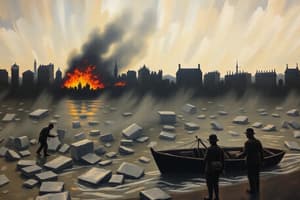Podcast
Questions and Answers
Which event marked the beginning of World War II?
Which event marked the beginning of World War II?
- The Munich Agreement
- The attack on Pearl Harbor
- The signing of the Treaty of Versailles
- The invasion of Poland by Germany (correct)
Which two ideologies gained significant influence in the 1930s and played a role in fueling World War II?
Which two ideologies gained significant influence in the 1930s and played a role in fueling World War II?
- Imperialism and Democracy
- Communism and Monarchism
- Fascism and Nazism (correct)
- Capitalism and Socialism
Which countries made up the Axis powers during World War II?
Which countries made up the Axis powers during World War II?
- Germany, Japan, Italy (correct)
- Germany, Italy, Soviet Union
- United Kingdom, France, United States
- France, Japan, Soviet Union
Which regions were part of the theaters of conflict during World War II?
Which regions were part of the theaters of conflict during World War II?
What was a key feature that characterized Fascism and Nazism in the lead-up to World War II?
What was a key feature that characterized Fascism and Nazism in the lead-up to World War II?
What event marked the United States' entry into World War II?
What event marked the United States' entry into World War II?
Which event halted the German advance on the Eastern Front during World War II?
Which event halted the German advance on the Eastern Front during World War II?
What was a significant outcome of World War II's aftermath?
What was a significant outcome of World War II's aftermath?
How many Jewish people were estimated to have been killed in the Holocaust?
How many Jewish people were estimated to have been killed in the Holocaust?
Which battle led to a rapid collapse of German defenses and the liberation of Western Europe?
Which battle led to a rapid collapse of German defenses and the liberation of Western Europe?
Flashcards are hidden until you start studying
Study Notes
Exploring the History of World War II
In the tumultuous years spanning from 1939 to 1945, the world found itself engulfed in a conflict of unimaginable scale and consequence: World War II. This global conflagration, marked by an unprecedented level of human suffering, would permanently alter the course of history and set the stage for the world we live in today.
The Rise of Fascism and Totalitarianism
World War II is often traced back to the aftermath of World War I, a time when nationalism and militarism rose to prominence in Europe. By the 1930s, totalitarian regimes, such as Fascism in Italy led by Benito Mussolini, and Nazism in Germany under Adolf Hitler, began to gain significant influence. Both ideologies stemmed from a desire to rebuild their respective nations, but their methods were steeped in violence, racism, and nationalism, fueling the eventual outbreak of war.
The Origins and Course of the Conflict
The war began with the invasion of Poland by Germany on September 1, 1939, following a series of clandestine agreements between Germany and the Soviet Union. As the war progressed, it became a clash between the Axis powers (Germany, Italy, and Japan) and the Allied powers (the United Kingdom, France, the United States, and the Soviet Union). The conflict encompassed multiple theaters, including Western Europe, Eastern Europe, North Africa, and the Pacific Islands.
The Holocaust and Atrocities
One of the most heinous aspects of World War II was the Holocaust, a systematic and state-sponsored persecution and murder of millions of Jewish people, as well as other minority groups, by the Nazi regime. Six million Jewish people, as well as an estimated 5 million other victims, were killed in concentration camps, gas chambers, and mass shootings. This horrific period in history serves as a chilling reminder of the darkest aspects of human behavior and the dangers of unchecked extremism.
The Turning Points
World War II was marked by a series of pivotal moments that altered the course of the conflict. These include:
- The Battle of Britain (1940) - A successful defense of the United Kingdom by the Royal Air Force.
- The attack on Pearl Harbor (1941) – The United States' entry into the conflict, following a surprise Japanese attack on a US naval base in Hawaii.
- The Battle of Stalingrad (1942-1943) – A pivotal turning point in the Eastern Front, which halted the German advance and shifted the balance of power.
- The Normandy invasion (1944) – A successful Allied invasion of German-occupied France, which led to a rapid collapse of German defenses and the liberation of Western Europe.
The Allied Victory and Aftermath
The war finally came to an end on September 2, 1945, following the surrender of Japan. The Allied victory was a profound moment of relief for the people of the world. However, the conflict left behind unparalleled destruction and suffering, and its consequences continue to resonate today.
The war's aftermath included the establishment of the United Nations, the Nuremberg Trials to bring to justice war criminals, and the division of Germany and Europe into competing blocs. The period also ushered in an era of decolonization and the emergence of new nations, many of which continue to grapple with the legacies of World War II.
World War II stands as a monumental event in history, one that continues to shape our understanding of global conflict, international relations, and the resilience of the human spirit. The lessons learned from this conflict are as vital today as they were over 70 years ago, as the world faces new challenges and opportunities in the 21st century.
Studying That Suits You
Use AI to generate personalized quizzes and flashcards to suit your learning preferences.




